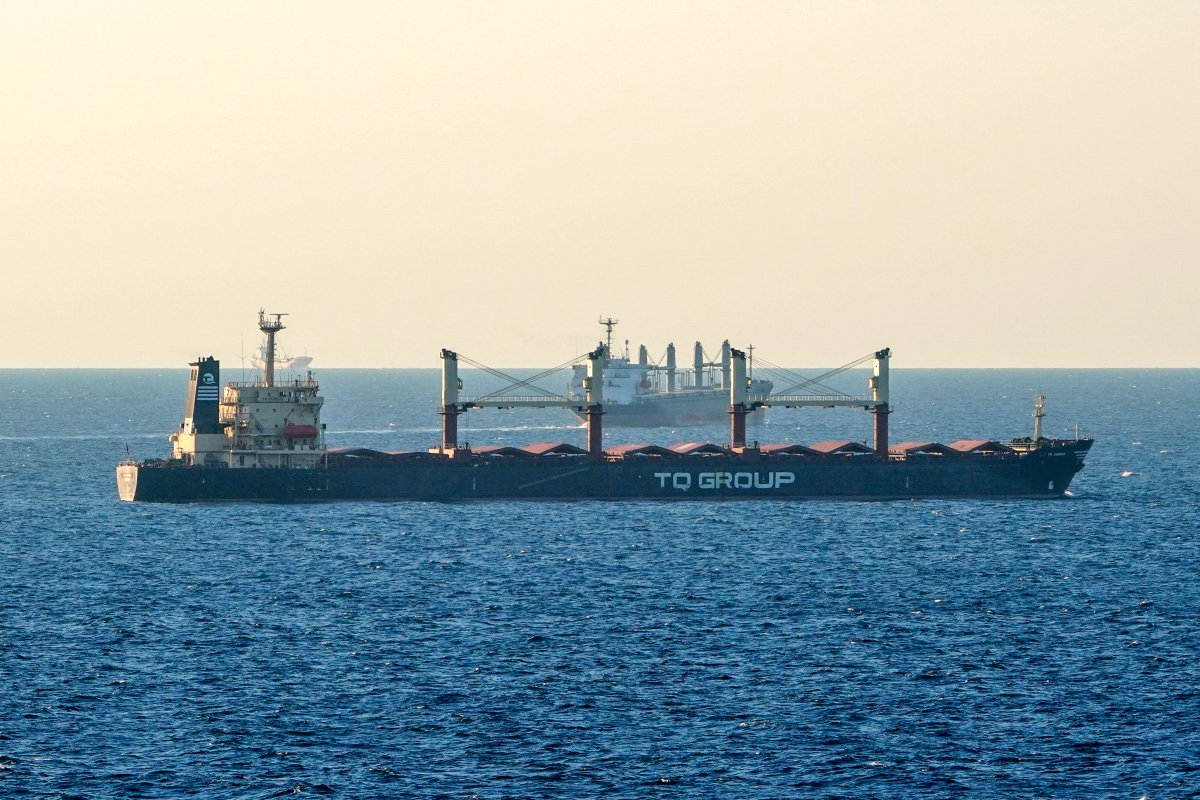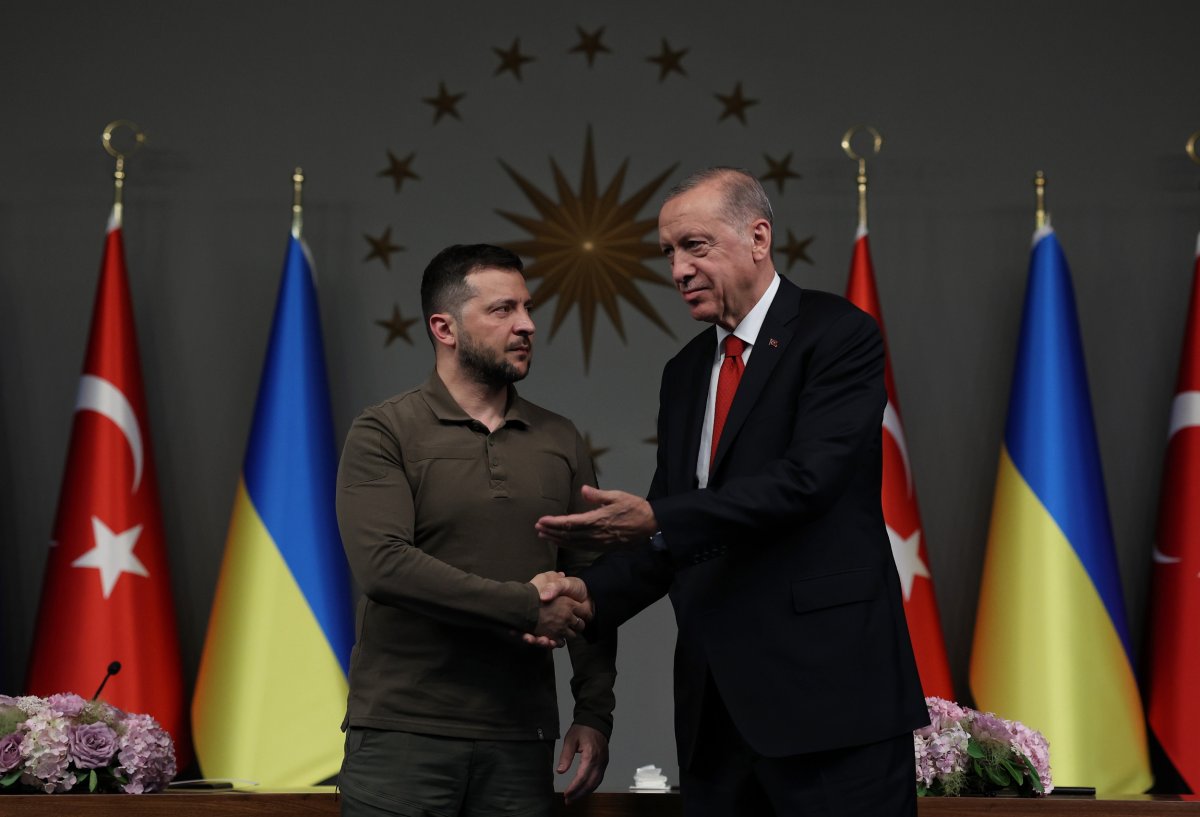Ukrainian President Volodymyr Zelensky appears to be setting up a showdown between his Turkish and Russian counterparts, with the hard-fought Black Sea grain export deal again appearing on the brink of collapse.
The Ukrainian president on Monday said he had "sent official letters" to President Recep Tayyip Erdogan and United Nations Secretary-General António Guterres, requesting that the three press ahead with the Black Sea grain export security deal without Russian participation. Moscow has said it will withdraw from the year-old accord following fresh explosions in Crimea.
"Ukraine, the UN and Türkiye can jointly ensure the operation of the food corridor and the inspection of vessels," Zelensky said. "It is necessary for everyone in the world—and everyone who supports it will become a savior of life in a huge territory from Morocco to China, from Indonesia to Lebanon."
"We are not afraid," Zelensky said in separate remarks published by spokesperson Sergii Nykyforov. "We were approached by companies that own ships. They said that they are ready, if Ukraine and Türkiye are ready to continue, then everyone is ready to continue supplying grain."

Moscow, meanwhile, has made its own appeal to the Turkish president.
Sergei Lavrov, Russia's foreign minister, spoke with his Turkish counterpart Hakan Fidan on Tuesday and proposed "an alternative" to the beleaguered Black Sea Initiative "for supplying grain to the countries most in need, not dependent on the subversive actions of Kyiv and its Western patrons," according to a readout published by the Russian Foreign Ministry.
Asked to comment on the chances of reviving the Black Sea deal, Russia's Foreign Ministry directed Newsweek to a statement published on Monday that described the results of the agreement as "disappointing."
It added: "If in the Western capitals the 'Black Sea Initiative' is really valued, then let them seriously think about fulfilling their obligations and [the] real removal of Russian fertilizers and food from sanctions. Only upon receipt of specific results, and not promises and assurances, will Russia be ready to consider restoring 'transactions.'"
Kyiv and Moscow are, again, competing for Erdogan's ear. The Turkish president has somewhat straddled the East-West divide over Russia's full-scale invasion of Ukraine, presenting Ankara as a peacemaker and taking a leading role in easing tensions in the Black Sea; a key strategic region that has become a hot theater of the war.
Erdogan has said he will continue talks to revive the Black Sea grain deal. "Despite the statement made today, I believe Russian President Putin wants the continuation of this humanitarian bridge," Erdogan said on Monday.
In a conversation planned for Monday, Erdogan said he and Putin would "discuss how we can act to open the way for the transport of Russian fertilizer and grain."
Fatih Ceylan, Turkey's former ambassador to NATO, told Newsweek he is "100 percent sure that President Erdogan will continue with these efforts," predicting "a period of continuous negotiations" but warning an immediate revival of the agreement is unlikely.
"It needs time," Ceylan said, as well as a new coordinating center to replace the Istanbul hub now being disbanded after Russia's withdrawal.
Turkey—a NATO nation with at least rhetorical ambitions to join the European Union—has closed the Bosporus and Dardanelles straits to Russian warships per the Montreux Convention, donated significant weaponry to Kyiv and allowed the construction of drone factories on Ukraine territory. Last month it allowed Azov Battalion defenders to travel home despite agreeing to prevent their return until the end of the conflict.
Erdogan's decision to drop his opposition to Sweden's NATO membership this month will also have disappointed the Kremlin.
But Ankara has still been reaping the rewards of its traditionally close economic ties with Russia. Since the start of the full-scale conflict and subsequent EU-G7 sanctions on Moscow, Turkey has significantly expanded trade with Russia.
Turkish exports in June were around 88 percent higher than at the beginning of 2023. From January to June 2023, Turkish exports to Russia were worth some $4.9 billion, compared with $2.6 billion over the same period in 2022.
A Black Sea Standoff
The relationship gives Erdogan leverage. "I think Russia needs Turkey more than Turkey needs Russia," Ceylan said. "The Russians do not have the luxury of brushing aside Turkey's interests under present circumstances."
"There will be a tense period, there's no doubt about it," Ceylan added. "Negotiating with Russians is not always easiest."
"There is again space for maneuver—albeit limited this time around—for Turkey to arrive at some common ground. But whether it will be a quadrilateral framework—I'm talking about Turkey, the UN, Ukraine, and Russia—or trilateral and bilateral tracks that complement each other, that remains to be seen."
But a new deal may look different from the one Moscow ditched, Ceylan added. "There will definitely be different parameters and conditions that will be in play," he said. "I think it's too early to try to identify what."

The collapse of the deal could lead to renewed peril for commercial shipping in the Black Sea. Andriy Ryzhenko, a retired naval captain and former deputy chief of staff in Ukraine's navy, told Newsweek that Moscow may look to "organize indirect provocations" against commercial shipping to deter their passage.
Russia may lay more naval mines—similar to the one that sunk an Estonian ship in March 2022—Ryzhenko said, or use relatively deniable methods such as airstrikes or drone attacks to target vessels.
"Obviously, if a first vessel will be damaged, this will be a big scandal and most probably these convoys will be stopped," Ryzhenko said. "And they will do it, otherwise they will lose their image."
But if Turkey decided to enforce safe passage for shipping using its significant naval power, Ankara—and by extension NATO—would risk a direct showdown with Moscow. "I'm not sure that they will do it, even if they are able to do it," Ryzhenko said.
"It would be very difficult to conceive of Turkey taking the center stage and ensuring guarantees for this corridor, because it may bring Turkey and Russia into confrontation with each other," Ceylan said.
07/19/23 9:05 a.m. ET: This article has been updated to reflect a response from the Russian Foreign Ministry.
Uncommon Knowledge
Newsweek is committed to challenging conventional wisdom and finding connections in the search for common ground.
Newsweek is committed to challenging conventional wisdom and finding connections in the search for common ground.
About the writer
David Brennan is Newsweek's Diplomatic Correspondent covering world politics and conflicts from London with a focus on NATO, the European ... Read more
To read how Newsweek uses AI as a newsroom tool, Click here.






